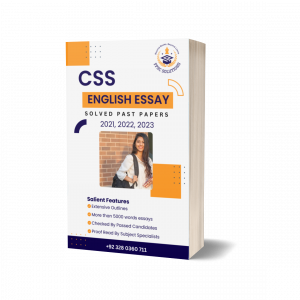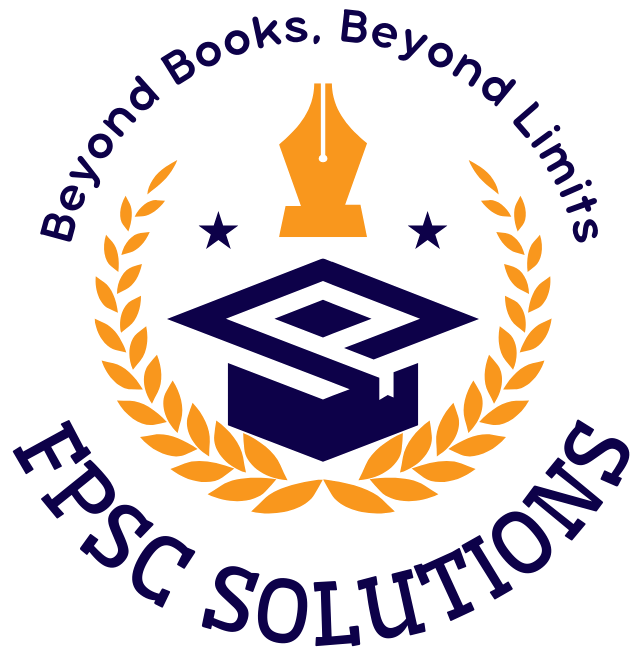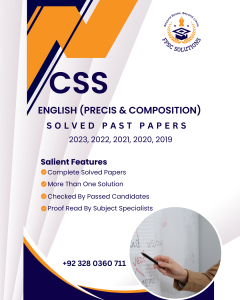The CSS English Essay paper is an important paper of the Central Superior Services (CSS) examination in Pakistan, known for its challenging and diverse essay topics. This solved paper is designed to help candidates prepare effectively by providing clear strategies for each question.
Whether you’re searching for CSS English Essay 2021 solved paper, or CSS Essay preparation material, this guide offers comprehensive insights to enhance your writing skills and boost your confidence. Understanding and practicing these essays will be key to your success in the CSS exam.
![CSS English Essay 2021 Paper [Solved] 2 css english essay](https://fpscsolutions.com/wp-content/uploads/2024/07/css-rnglish-essay.jpeg)
CSS English Essay 2021 Paper
Q1. “Do not waste water even if you were at a running stream”.
Q2. Meaning purposive education.
Q3. COVID-19: A wake-up call for Pakistani researchers.
Q4. Human inventions move societies backward.
Q5. Universal human equality is utopic.
Q6. Bureaucracy doldrums.
Q7. Gender equality: A popular slogan.
Q8. Pros and cons of globalization.
Q9. Intercultural communication is a panacea to avoid the 3rd world war.
Q10. “I fall upon the thorns of life! I bleed”.
The CSS English Essay 2021: Solved Paper with Research Paper Citations
-

CSS ENGLISH ESSAY SOLVED PAST PAPERS 2021, 2022, 2023
₨ 1,499 – ₨ 3,999Select options This product has multiple variants. The options may be chosen on the product page
2021 CSS English Essay Paper Strategies for Each Topic
Q1. “Do not waste water even if you were at a running stream”.
Start with an introduction highlighting the importance of water conservation. Discuss the global water crisis and the significance of preserving water resources. Provide examples of water-saving practices and policies. Conclude by emphasizing the need for sustainable water use for future generations.
Q2. Meaning purposive education.
Begin by defining purposive education and its objectives. Discuss the difference between purposive and traditional education. Provide examples of purposive education systems and their benefits. Conclude by highlighting the importance of aligning education with societal needs.
Q3. COVID-19: A wake-up call for Pakistani researchers.
Introduce the impact of COVID-19 on global and Pakistani research. Discuss the challenges faced by researchers during the pandemic. Highlight the opportunities for innovation and collaboration that emerged. Conclude by stressing the importance of research in addressing future crises.
Q4. Human inventions move societies backward.
Start by presenting the argument that not all inventions lead to progress. Provide examples of inventions that had negative impacts on society, such as environmental pollution or social isolation. Discuss the balance between technological advancement and societal well-being. Conclude by suggesting ways to ensure inventions contribute positively.
Q5. Universal human equality is utopic.
Begin by defining universal human equality and why it is considered utopic. Discuss historical and contemporary examples of inequality. Analyze the obstacles to achieving true equality, such as economic disparity and cultural differences. Conclude by suggesting steps towards a more equal society, while acknowledging the challenges.
Q6. Bureaucracy doldrums.
Introduce the concept of bureaucracy and its role in governance. Discuss the problems associated with bureaucratic systems, such as inefficiency and corruption. Provide examples from different countries, including Pakistan. Conclude by suggesting reforms to improve bureaucratic effectiveness.
Q7. Gender equality: A popular slogan.
Start by explaining the concept of gender equality and its popularity as a slogan. Discuss the progress made towards gender equality and the remaining challenges. Provide examples of successful gender equality initiatives. Conclude by emphasizing the need for continued efforts to achieve true equality.
Q8. Pros and cons of globalization.
Introduce the topic by defining globalization. Discuss the benefits of globalization, such as economic growth and cultural exchange. Analyze the drawbacks, including economic inequality and cultural homogenization. Conclude by weighing the overall impact of globalization and suggesting ways to mitigate its negative effects.
Q9. Intercultural communication is a panacea to avoid the 3rd world war.
Begin by defining intercultural communication and its importance. Discuss historical and contemporary examples where intercultural communication prevented conflicts. Analyze the potential of intercultural dialogue in preventing future wars. Conclude by emphasizing the need for promoting intercultural understanding.
Q10. “I fall upon the thorns of life! I bleed”.
Start by interpreting the quote and its metaphorical meaning. Discuss how challenges and hardships are part of life. Provide examples of individuals who overcame adversity. Conclude by highlighting the resilience and strength required to navigate life’s difficulties.
In Summary, the CSS English Essay paper is a vital component of the CSS examination, assessing candidates’ analytical and writing skills. This solved paper provides a complete roadmap for tackling each essay question effectively, helping you to prepare thoroughly and confidently. Mastering these essays will significantly enhance your chances of success in the CSS exam, paving the way for a rewarding career in Pakistan’s civil services.

![CSS English Essay 2021 Paper [Solved] 1 css english essay](https://fpscsolutions.com/wp-content/uploads/2024/07/CSS-ENGLISH-ESSAY-ORIGINAL.png)
